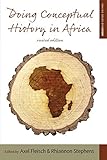Doing Conceptual History in Africa / ed. by Rhiannon Stephens, Axel Fleisch.
Material type: TextSeries: Making Sense of History ; 25Publisher: New York ; Oxford : Berghahn Books, [2018]Copyright date: ©2018Description: 1 online resource (258 p.)Content type:
TextSeries: Making Sense of History ; 25Publisher: New York ; Oxford : Berghahn Books, [2018]Copyright date: ©2018Description: 1 online resource (258 p.)Content type: - 9781785338625
- 9781785339523
- 960 23
- online - DeGruyter
| Item type | Current library | Call number | URL | Status | Notes | Barcode | |
|---|---|---|---|---|---|---|---|
 eBook
eBook
|
Biblioteca "Angelicum" Pont. Univ. S.Tommaso d'Aquino Nuvola online | online - DeGruyter (Browse shelf(Opens below)) | Online access | Not for loan (Accesso limitato) | Accesso per gli utenti autorizzati / Access for authorized users | (dgr)9781785339523 |
Frontmatter -- Contents -- List of Maps, Figures and Tables -- Acknowledgements -- Notes on Language -- Introduction. Theories and Methods of African Conceptual History -- Chapter 1. ‘Wealth’, ‘Poverty’ and the Question of Conceptual History in Oral Contexts: Uganda from c. 1000 CE -- Chapter 2. Conceptual Continuities: About ‘Work’ in Nguni -- Chapter 3. Tracking the Concept of ‘Work’ on the North-Eastern Cape Frontier, South Africa -- Chapter 4. Understanding the Concept of ‘Marriage’ in Afrikaans during the Twentieth Century -- Chapter 5. Male Circumcision among the Bagisu of Eastern Uganda: Practices and Conceptualizations -- Chapter 6. The Concept of ‘Land’ in Bioko: ‘Land as Property’ and ‘Land as Country’ -- Chapter 7. Conceptualizing ‘Land’ and ‘Nation’ in Early Gold Coast Nationalism -- Chapter 8. An Untimely Concept: Decolonization and the Works of Mudimbe, Mbembe and Nganang -- Index -- MAKING SENSE OF HISTORY
restricted access online access with authorization star
http://purl.org/coar/access_right/c_16ec
Employing an innovative methodological toolkit, Doing Conceptual History in Africa provides a refreshingly broad and interdisciplinary approach to African historical studies. The studies assembled here focus on the complex role of language in Africa’s historical development, with a particular emphasis on pragmatics and semantics. From precolonial dynamics of wealth and poverty to the conceptual foundations of nationalist movements, each contribution strikes a balance between the local and the global, engaging with a distinctively African intellectual tradition while analyzing the regional and global contexts in which categories like “work,” “marriage,” and “land” take shape.
Mode of access: Internet via World Wide Web.
In English.
Description based on online resource; title from PDF title page (publisher's Web site, viewed 25. Jun 2024)


